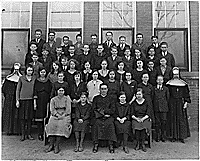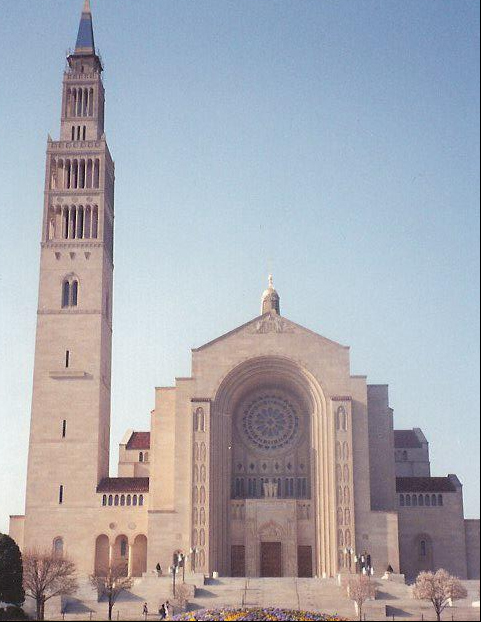Spotlight Archive
“The history of every human being passes through the threshold of a woman's motherhood,” John Paul II wrote in Familiaris Consortio (1988). No group could be more important to the history of American Catholicism than the Catholic mothers of this country. Yet, it is by its nature a largely hidden and unheralded role that mothers play in the past. This Mother’s Day, we pay some small tribute to those millions of Catholic mothers by highlighting the lives of a handful of them.
As in other dimensions of Catholic life in America, convert-mothers were prominent. Anne Hanson Dorsey converted to Catholicism in 1840. Mother to three daughters and a son (who died during the Civil War), she brought a Catholic sensibility to the emergent field of young adult literature. Another nineteenth-century convert was Letitia Lewis, whose entry into the Church initiated a wave of conversions from one of the most prominent Virginia families—the culmination being that of her mother, Letitia Floyd.
Of more dubious fame was Mary Surratt, who, with her son John, was accused of conspiracy in the plot to assassinate Abraham Lincoln. She was executed (some say unjustly) in 1865. Margaret Haughery experienced the sorrows of motherhood: her husband and infant died shortly after the family emigrated from Wales to New Orleans. A woman of independence and generosity, she founded a thriving bakery and donated her talents and earnings to the care of orphans.
Katherine Conway, meanwhile, applied her literary talents to promoting a Catholic vision of motherhood. The daughter of Irish immigrants, Conway was the first female editor of the Boston Pilot. Boston was also the scene of the motherly activity of Rose Kennedy. Beginning with Joseph, Jr., in 1915, she gave birth to nine children, including two future US senators, one President—and several mothers.
Philadelphia native Grace Kelly enjoyed a celebrity motherhood of a different sort. A Hollywood film star, she married Prince Ranier of Monaco, with whom she had three children before her accidental death in 1982.
 Less glamorous but no less eventful was the experience of Dorothy Day. Day’s pregnancy with her daughter Tamar was one of the factors leading to her conversion from atheism to Catholicism. Her common-law husband having deserted her, Day was a single mother through most of Tamar’s upbringing. Her daughter cooperated in Day’s Catholic Worker movement.
Less glamorous but no less eventful was the experience of Dorothy Day. Day’s pregnancy with her daughter Tamar was one of the factors leading to her conversion from atheism to Catholicism. Her common-law husband having deserted her, Day was a single mother through most of Tamar’s upbringing. Her daughter cooperated in Day’s Catholic Worker movement.
Catholic women played a leading role in defending motherhood after 1960, when its dignity was called into question by some feminist writers. Pulitzer Prize-winning poet and mother of two Phyllis McGinley wrote Sixpence in Her Shoe as a celebration of homemaking, in response to Betty Friedan’s Feminist Mystique (1963). Housewife Ellen McCormack ran for the Democratic nomination for president in 1976, emphasizing her pro-life credentials. Mother of six Phyllis Schlafly led conservative opposition to the Equal Rights Amendment during the 1970s. As in most other areas, Catholic views were diverse: A more liberal voice was mother and journalist Marion Mitchell Stancioff, who wrote about women and family for Catholic periodicals such as Commonweal and Integrity.
A Catholic understanding of motherhood encompasses more than a natural occurrence. Thus Catholic parlance includes the title mother for women religious superiors, acknowledging the reality of spiritual motherhood. Elizabeth Ann Seton fully experienced both spheres. She confronted enormous challenges as a widowed mother, then founded the Sisters of Charity. She went on to become the first American-born woman—and first biological mother—to be named a saint.
Mother Frances Cabrini, who founded the Missionary Sisters of the Sacred Heart, is, like Mother Seton, a canonized saint. Another saint-foundress was Mother Katharine Drexel, whose Blessed Sacrament Sisters were dedicated to serving African- and Native Americans. Recently joining the ranks of female American saints is Mother Theodore Guerin, whose Sisters of Providence pioneered Catholic education in nineteenth-century Indiana.
 The work of these Catholic sisters provided ample opportunity for the application of motherly instincts: hospitals, orphanages, and schools were common apostolates and religious women were often the first to bring these serving institutions to the nation’s untamed wildernesses and chaotic cities. Mother Catherine Spalding, part of a prominent Maryland family, led the Sisters of Charity of Nazareth on the Kentucky frontier in the early nineteenth century. Mother Angela Hughes helped to build Sisters of Charity establishments in New York.
The work of these Catholic sisters provided ample opportunity for the application of motherly instincts: hospitals, orphanages, and schools were common apostolates and religious women were often the first to bring these serving institutions to the nation’s untamed wildernesses and chaotic cities. Mother Catherine Spalding, part of a prominent Maryland family, led the Sisters of Charity of Nazareth on the Kentucky frontier in the early nineteenth century. Mother Angela Hughes helped to build Sisters of Charity establishments in New York.
 “Each and every time that motherhood is repeated in human history,” John Paul wrote in Familiaris, “it is always related to the Covenant which God established with the human race through the motherhood of the Mother of God.” Devotion to Mary has been an essential part of the faith lives of many American Catholics. One indication of this devotion is the twenty-one basilicas dedicated to her. They include the National Shrine of the Immaculate Conception in Washington, DC, under which title the country’s first bishop, John Carroll, consecrated the nation to Mary. She was formally named patroness of the United States by Pope Pius IX in 1847.
“Each and every time that motherhood is repeated in human history,” John Paul wrote in Familiaris, “it is always related to the Covenant which God established with the human race through the motherhood of the Mother of God.” Devotion to Mary has been an essential part of the faith lives of many American Catholics. One indication of this devotion is the twenty-one basilicas dedicated to her. They include the National Shrine of the Immaculate Conception in Washington, DC, under which title the country’s first bishop, John Carroll, consecrated the nation to Mary. She was formally named patroness of the United States by Pope Pius IX in 1847.
Motherhood in any of its various forms demands strength and compassion; it requires generosity and sacrifice; it entails joy and sorrow. Catholic women in the United States have not only exemplified these qualities and participated in a tradition of Catholic mothers reaching back to the time of Christ. They have helped to define the character of motherhood and family life and thereby shaped history in a fundamental and lasting fashion.
©2010 CatholicHistory.net. Posted May 8, 2010.
Photos, from top: Dorothy Day, courtesy of the Marquette University Archives, Milwaukee Journal, 1968; Pictures Kept by Supt. L. S. Bonnin, Cheyenne and Arapaho Agency: Catholic School (ca. 1920), courtesy of National Archives and Records (unrestricted); National Shrine of the Immaculate Conception, ©CatholicHistory.net.
